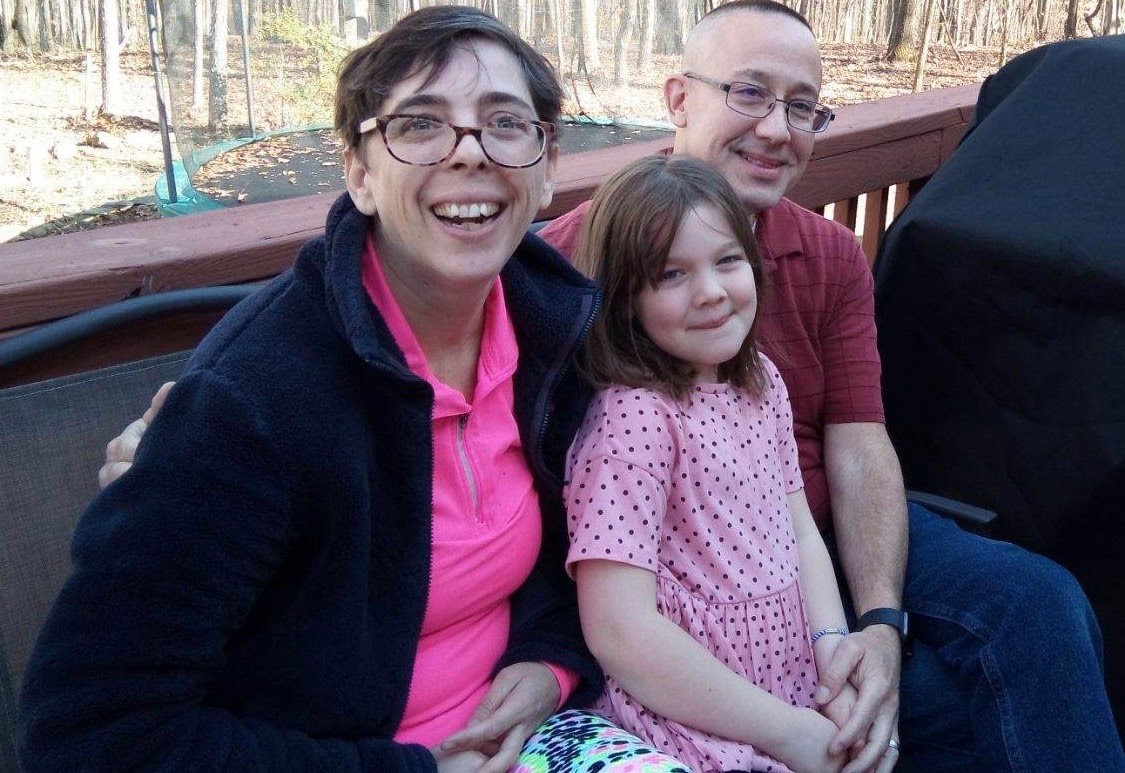May is Huntington’s Disease Awareness Month. While this rare and fatal disease may be unfamiliar to some, it affects tens of thousands of Americans. At Catholic Charities we are proud to be one of a very few organizations to serve this specific community of patients through our St. Jude’s Project. To honor HD Awareness Month, we are sharing information about St. Jude’s and stories from the program’s dedicated staff and the courageous patients they serve.
“Huntington’s Disease is like having Alzheimer’s, Parkinson’s, and ALS all in one.”

That’s how Paul Esquivel describes the rare disease affecting his wife, Liz.
The Esquivels’ lives changed in a flash after Liz was diagnosed with the hereditary and incurable neurodegenerative disorder in 2015. They moved quickly to build a comprehensive medical team at Georgetown University Medical Center (GUMC) to ensure Liz received the best care. Overwhelmed with information they struggled to understand, it wasn’t until their social worker at GUMC connected them with Catholic Charities’ St. Jude’s Project that they were able to put all the pieces together.
Huntington’s Disease (HD) breaks down nerve cells in the brain and weakens one’s physical and mental abilities over time. Before her diagnosis, Liz thought something might be wrong when she noticed one of her hands started shaking involuntarily and she started dropping things while working as a receptionist at a doctor’s office. Her symptoms worsened as time progressed and ultimately led to a car accident. Paul urged her to see a neurologist thinking she might have multiple sclerosis, a theory that was ruled out after three MRIs and a series of other tests.
The Esquivels visited multiple doctors and specialists who were unable to identify her condition. Because there is still so much to learn about HD, many doctors are hesitant to diagnose the disease with full confidence. But luckily, the couple was referred to specialists at Georgetown’s Huntington Disease Care, Education & Research Center, where doctors conducted genetic tests that determined Liz had HD.
Liz and Paul married in October 2015, but they were never able to fully enjoy their “honeymoon phase” because Liz received her official diagnosis only two months later. The revelation came as a shock to Liz and her medical team, as HD is exclusively inherited from a parent with the disease. Additional genetic testing revealed that, unbeknownst to him, her father carried the gene, despite never showing symptoms. As the fifth of 14 children, Liz’s diagnosis inspired her siblings with children to be tested for the gene.
A year after her diagnosis, Georgetown referred Liz to Catholic Charities’ St. Jude’s Project to add the final piece to her care team. St. Jude’s Project provides critical and compassionate support at no cost to families and patients whose lives are affected by neurodegenerative disorders.
Liz’s St. Jude’s social workers have accompanied her to her medical appointments and have helped her research relevant topics like funding for HD research.
Molly Bayer, a graduate student at George Mason University, is the Esquivels’ current social worker through St. Jude’s. “She keeps us up to date on what’s happening in the HD world,” Paul said. “Molly has been a tremendous support to our whole family and is essential to Liz’s care team.”
But Molly has also been essential for Paul. One of the defining characteristics of St. Jude’s unique Therapeutic Patient Navigation model is that staff understand that a patient’s caregiver also needs care and support. Paul is learning about the disease along with his wife. He currently balances his full-time job in D.C. – a daily 110-mile roundtrip commute from his home in Virginia – with caring for Liz and her second-grade daughter Kathryn.
Liz’s symptoms have become more pronounced and now include choking fits and deteriorating coordination. Sometimes Paul needs to remind her to chew. Other times he needs to help her change clothes. He helps administer her nine medications, one of which costs $65,000 per year alone. He had to fight to get Liz on Medicaid to cover the cost of home care so the family wouldn’t be crippled by lifelong costs of her care. Paul admits that it’s been tough on him and that he sometimes gets impatient with his wife.
Luckily for Paul, St. Jude’s has been there to support him as much as Liz. Molly, like the family’s previous St. Jude’s social worker, has helped him manage the stress he’s experienced learning how to be a caregiver. She’s been able to shift some weight off his shoulders by serving as a communications hub, project manager, medical translator, and advocate for him and his wife. She also understands the unique challenges that caregivers face and has been able to provide Paul with emotional support and a sympathetic ear. She also continues to educate the couple about the disease so they can prepare for the future knowing that Liz’s cognitive and physical abilities will continue to deteriorate.
But despite the road ahead, the Esquivels are focused on the present. They are surrounded by large supportive families (Paul is one of seven children) who are always willing to lend a hand. They recently joined a community pool, and Liz is looking forward to spending time with her family while increasing her activity levels. She also recently celebrated her birthday and was surprised to receive cards from Kathryn’s whole class.
It’s important to Liz that her daughter learns to live in the moment because, as she says, “love is all around.”
Related: St. Jude’s Project — A Compassionate Approach to Caring for an Underserved Population